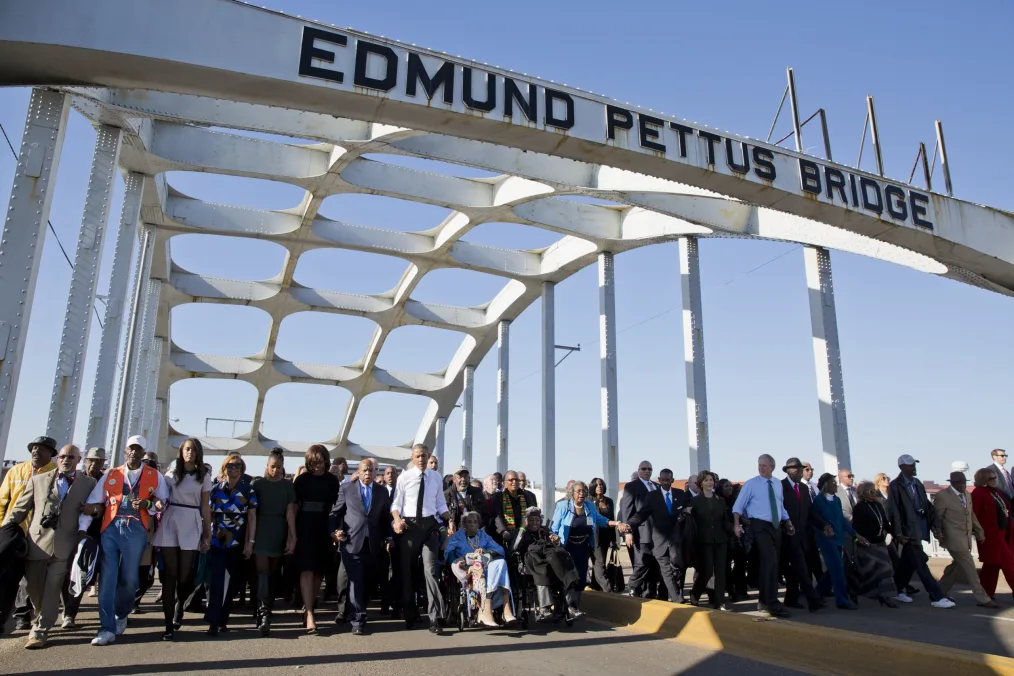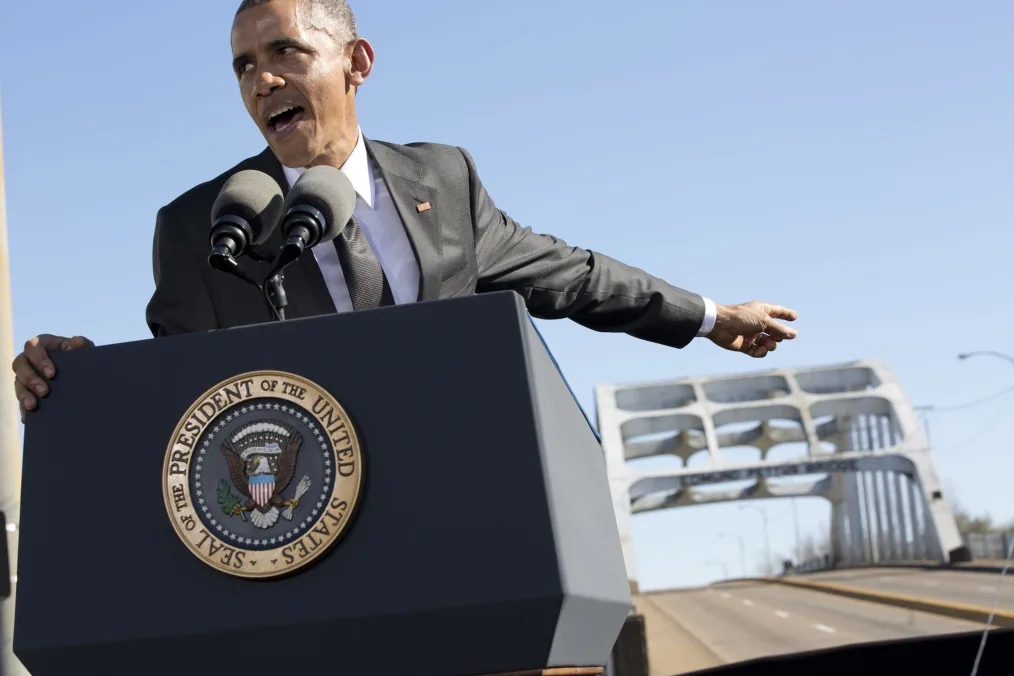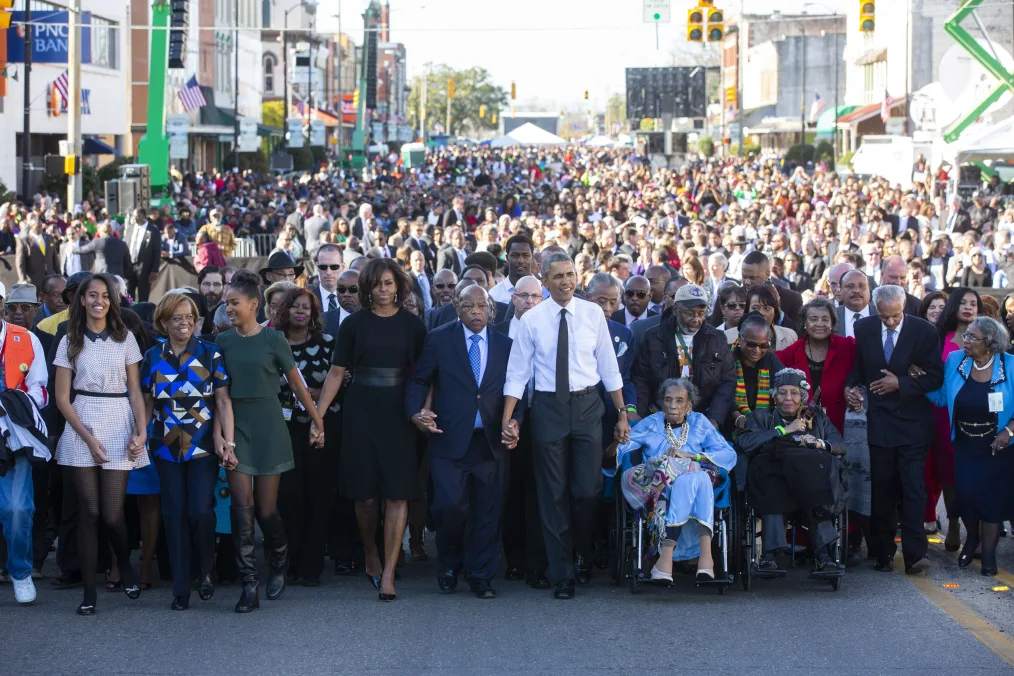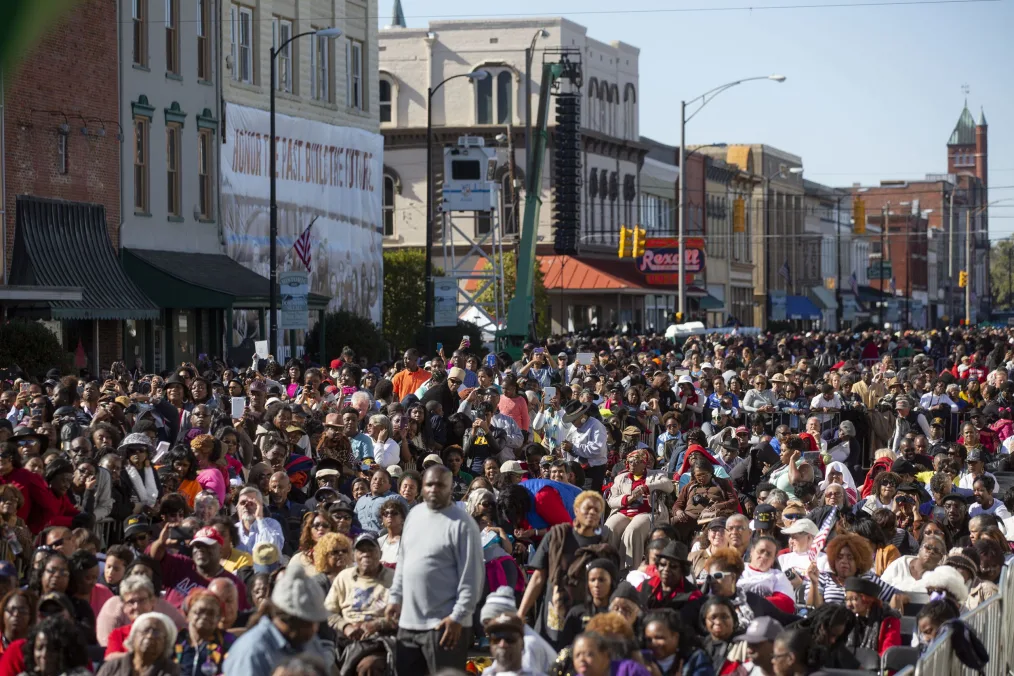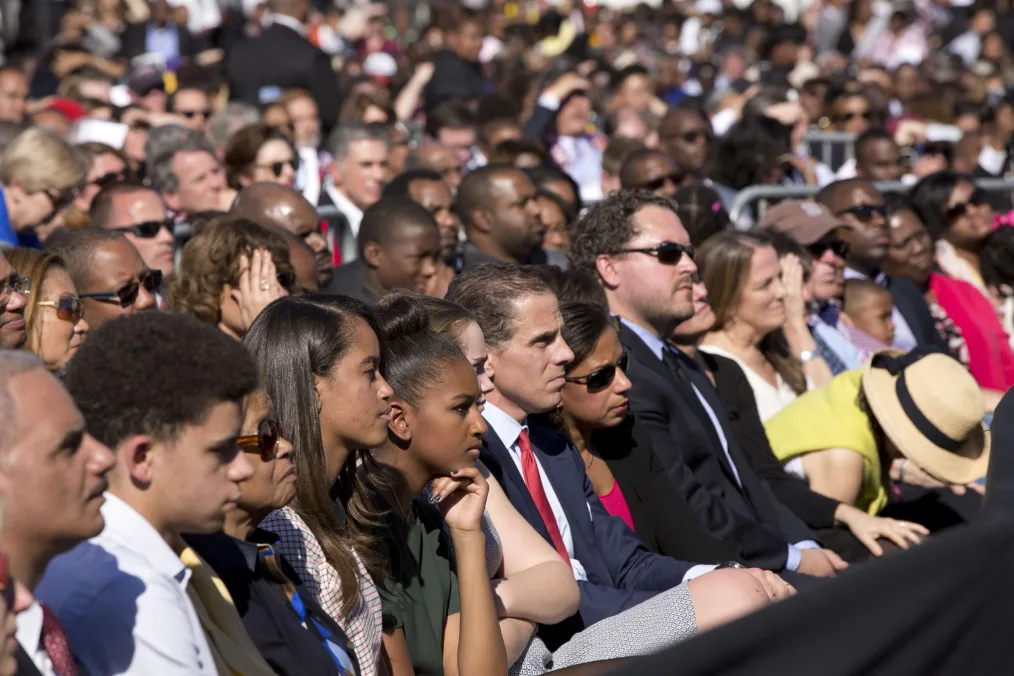A conversation with Cody Keenan, former White House chief speechwriter
In March we unveiled the quote from President Obama that will appear on the exterior of the Museum of the Obama Presidential Center. Excepted from his speech that marked the 50th anniversary of the March for Voting Rights from Selma to Montgomery, the words speak to President Obama’s idea of what America should be, and the need for each generation to build upon the work of those who came before.
To learn more about the story behind that speech and that quote, we spoke with Cody Keenan, former White House Chief Speechwriter to President Obama. Below is an edited transcript of that conversation.
Q: To start, can you tell me how you learned you were supposed to draft a speech for the 50th Anniversary of Selma? How did you try to figure out what to say?
Cody Keenan: I found out in January. It's a pretty rare gift to be given a month and a half of advance notice for a speech. It gives you time to read and to think.
He’d have to pay tribute to the moment, which is easy enough. It's remarkable that 50 years later, a Black president would be going back to Selma. That on its own is a testament to what the marchers did. But Barack Obama always wants to make a bigger argument.
President Obama really always was our chief speech writer. He sets the tone. The speech tapped into this narrative thread that stretches throughout his whole career in public life: from the 2004 convention speech to the 2008 campaign, to some of the moments in the White House and beyond -- and it's that the story of America is a story of progress, however halting or disjointed. Sometimes you take a step or two steps back for every step forward, but the story of America is one of progress and constant change. What makes us unique and exceptional is that we are always striving to expand the ideals in our founding document until they apply to everybody. And Selma was this great, big, shining example of that.
At the time, there was this idea that was growing louder in the media -- it was no longer a dog whistle, it was kind of a clumsy bullhorn -- that half the country is “un-American” and “not like us.” You saw this coming out of the right wing and Republican Party more frequently -- this idea that America is reserved for certain people who have to be a certain way. It felt like it was time to talk about that question of who belongs and who gets to decide who belongs. Selma gave us a way to talk about that idea.
One of the things he wanted to do was to consecrate Selma as this sacred place in American history -- as important as Gettysburg and Appomattox, Lexington and Concord. I think the line he added to the very first draft that put the speech and 400 years of American history into such clear focus, was, "It was not a clash of armies, but a clash of wills -- a contest to determine the meaning of America.” It summed up the entire speech and all that history in one line. Even now in 2021, you look at what's going on in politics and we're still in that clash of wills between who gets to decide what America is: whether it's this country that's reserved only for a certain few or whether it's for everybody. That was the speech.
Q: When you thought about what to include in the speech, what jumped out to you reading about these people 50 years later?
The first thing you think of is their extraordinary courage. I've always been interested in what goes on before the big moments in those quiet moments, when you're not sure if it's going to work out or not. I tried to identify some of those moments for the Selma speech -- what happened in the few hours before they set out to march.
I was just so struck by the marchers milling about in the church basement that morning. They didn't know what was about to happen. They didn't know that it would become this consequential moment in American history. I do think they all knew that they were risking their lives. They all knew there was a chance they'd be attacked. There was a doctor telling people, "Here's what tear gas does to your body.”
You saw echoes of that last summer in the protests across America. One of the things that stuck out was -- in another echo to today -- the people in power. They knew the marches were coming, and they had already been out there publicly labeling the protestors as deviants and “Communists”, as moral degenerates and outside agitators.
Q: Talk to me about working with the President on it.
It was one of those speeches where every draft got better -- which isn't always the case. The speech was on a Saturday. We had met the Monday before to talk about it. Then something great happened: the federal government shut down on Thursday for snow. So I went into the office knowing that most of the President’s schedule would be pulled down and I could steal more of his time than I ever usually would be able to. We ended up passing a few drafts back and forth that day, which we rarely got to do.
Too often, certainly in politics, American history is told as, "We're the revolutionary patriots, and we're pioneers who went West, and these fresh faced GI's who went to save Europe, and we went to the moon, and now we're here." But there's so much more to the story. There’s so much more that makes us exceptional, people who, like the marchers in Selma, often at great risk to themselves, showed us the true genius of America: that we can change. We weren’t always taught their names in school. But that doesn’t mean they're not real, or vital to who we ultimately became.
We talked about how to get at that idea and President Obama said, "Why don't you and Ben Rhodes work up a list of the people who made us who we really are?" So I called Ben and we came up with a list of about a hundred people to consider including in the speech. It became this great riff that included Sojourner Truth, Fannie Lou Hamer, Susan B. Anthony, enslaved people who built the White House and economy of the South, laborers who laid rail and raised skyscrapers, and organized for workers’ rights. Ben suggested Jackie Robinson, and Obama turned that into a great line: "We are Jackie Robinson, enduring scorn and spiked cleats and pitches coming straight to his head, and stealing home in the World Series anyway."
Each point was, we're not just the triumphant story we're told, we're all these other messy, courageous stories, too. We’re trying to say that everyone belongs here. And that in no way diminishes the stories we all know it adds to them. That was really important to him. It’s rare in presidential speeches that you get to be joyous and jubilant, and that's what this was -- it was this love letter to America and where we've been, how we’ve grown through all our mistakes, and what we have the capacity to be.
Over Thursday and Friday, we passed five drafts back and forth. I think we nailed it down around 12:30 in the morning on Saturday. Obama emailed to say, “Done. Proud of it.” But he will work on any speech for as long as he possibly can. So even Saturday morning, after we boarded Air Force One, he asked to see the final draft.
We had this riff in there about how “the single most powerful word in our democracy is the word ‘we’-- ‘we the people,’ ‘we shall overcome,’ ‘yes, we can.’ That word is owned by no one, it belongs to everyone.”
He took out "yes we can.” His argument was, "it makes it too much about me." It was the catchphrase in the 2008 campaign, and all.
I said, “But that’s the thing. It’s like you always said: it's not about you. That was about us. That was about the people who organized for you and made that campaign their own. And by the way, we stole it from César Chávez, so it's not even yours to begin with.” He laughed at that, and left to work on it. When he returned the draft, just before landing in Alabama, with his edits on it, he’d added “yes we can” back in along with another line: "Oh, what a glorious task we are given to continually try to improve this great nation of ours."
Q: That line you mentioned, "Oh, what a glorious task..." will be on the side of the Museum of the Obama Presidential Center. Can you expand on what you think that line meant to him? Why put something like that in there?
He's somebody who knows that he's only here because of what earlier generations did for him. The way he views not just politics, but American history, is that we run our leg of the race, we hand off the baton when we're done, and hopefully we've made things a little bit better. Maybe not perfect, but better.
That’s the point of politics. That’s the imperative of citizenship. And if we live up to that, we may not finish the march, but we’ll get closer. We may not perfect our union, but our kids will be closer. So the question he posed was, what can we do to make the next generation’s lives a little better? And the generation after that?
Q: To close, can you talk to me about the rest of your day after he handed you the speech on the plane?
I'd never been to Selma, so I was excited. There were still moments working in the White House, even in year seven, where you can let your guard down and just bask in something extraordinary. I remember riding in the motorcade, this show of American power rumbling down this rural road, passing people on the side of the street waving American flags. At one point, we passed this mural that had a big painting of Obama's face and said, "Hands that picked cotton, picked the president." Our history was all around us, the bad and the good. You could feel it. And when the motorcade crested the Edmund Pettus bridge, you could see tens of thousands of people stretched down the streets of Selma.
I rarely sat in the audience for a speech. I preferred to watch or listen from backstage or the back of the hall. But Valerie Jarrett had very kindly saved me a seat. So for me it was the rare opportunity to just watch. John Lewis was on stage with the bridge behind it and it was this powerful moment where you allowed yourself to feel emotional and patriotic and proud and let that lump in your throat linger for a little bit.
After the speech, we crossed the bridge, staying ahead of the President, who, along with President Bush, led an annual reenactment of the march. It was really humbling to be able to visit there, a site as important to American history as any other.
When we were back on the plane that afternoon, the sun was starting to get low and there was this beautiful, warm orangish glow. President Obama came by my seat. He was in good spirits. He said, “I think that was pretty good.” It was the highest praise we’d ever get for a speech. "Even Sasha liked that speech," he said.
He seemed happier about that than anything else.
Watch the full Selma speech:

